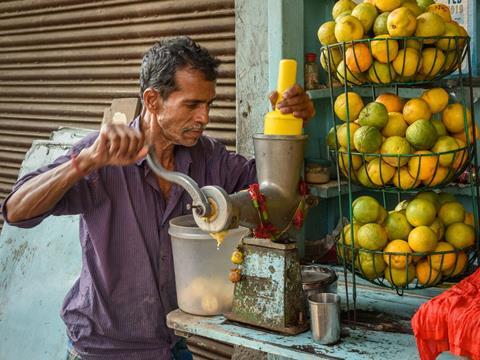
A new study by Zero Waste Europe, Searious Business, and National Hawker Federation (NHF) suggests that transitioning around 80,000 street vendors in Kolkata, India into reusable systems would bring social and economic benefits and cut down on plastic waste by over 86% – a reduction that would not be limited to single-use plastics.
Such a change would also create more than 2,250 jobs and give a return on investment of 21% and a payback period of 2.3 years, the study suggests. If the same transition were to take place in Delhi with 99,000 street food vendors, it is believed that the economies of scale would result in an ‘even more economically favourable’ outcome.
Over 99% of plastics are currently made using fossil fuels, the companies point out. If the plastic industry was a country, it would reportedly come fifth in the rankings of the world’s largest greenhouse gas emitters.
An excess of 16,000 chemicals are used in these plastics with 25% of them classified as hazardous. According to one estimate, the lifetime cost of plastic produced in 2019 reached US$3.7 trillion, which is higher than the GDP of India in 2022.
Therefore, NHF is pushing for a ‘just transition’ in which street vendors can replace single-use plastics with reuse systems. The Indian delegation at INC-3 is encouraged to align with other delegations, scientists, and civil society organizations in campaigning for a legally binding, time-bound Global Plastics Treaty that enforces strong production controls, sets ambitious reuse and refill targets and guidelines, and supports the safety and livelihoods of workers and communities across the plastics supply chain.
Reportedly, reuse systems in street vending could help influence a change in consumer behaviour and reverse ‘harmful throwaway culture’, as well as benefitting public health, the economy, and social climate justice – especially as Indian street vendors are thought to serve more than 600 million meals daily.
“Street vendors face the hazards of climate change every day, and clearly understand the role of plastics in the triple threats of climate, biodiversity, and pollution,” explained Saktiman Ghosh, general secretary of NHF. “We wholeheartedly embrace reuse systems and ask the Government of India to provide an enabling regulatory framework and infrastructure.”
Joan Marc Simon, director-founder of Zero Waste Europe, continued: “Evidence shows that reuse systems in street-vending are the most sensible and economic way to prevent waste and strengthen the local economy. Yet, to be effective they need to be rolled out at scale and this can only happen if public institutions provide the right legal framework.
“We call India, Europe, and any other country or region committed to move away from plastic pollution to pass legislation in favour of reuse systems.”
“The numbers in India are so astronomical, it’s hard to visualize,” said Willemijn Peters, CEO of Searious Business. “So many vendors, so many people, so much packaging. If there is a compelling business case for reusable packaging in such a complex scenario, it can work anywhere. It’s simple, reuse adds up.”
“By the industry’s own estimates, India’s single-use plastic ban targets only 2 – 3% of total plastic produced,” Mecanzy Dabre, deputy general secretary of NHF, pointed out. “The ban conspicuously excludes plastic packaging used by FMCGs, such as sachets and other multilayered packaging, which accounts for about 50% of the problem.
“If street vendors can transition all their internal operations to reusables, the plastic waste still generated would be due to packaging choices made by FMCGs.”
Satyarupa Shekhar, an independent plastics activist, added: “The Global Commitment Five Years In: Perspective On Progress and 2023 Progress report show how FMCGs have failed to bring down virgin plastic use meaningfully, making little to no progress to expand reuse.
“Unilever and Nestlé repeatedly say that reuse is economically prohibitive, but we now have Indian street vendors make the best business case for large-scale reuse systems - at a fraction of the marketing budgets of these FMCGs!”
The study comes after UNESDA’s criticism of new revisions to the Packaging and Packaging Waste Regulation. It believes that the current text is not considering the implementation of reuse and refill on a case-by-case basis and negatively impacting applications in which recyclable single-use packaging would be more environmentally beneficial.
The organization was among several who signed a joint letter calling for the complementarity of reusable and single-use recyclable packaging and the prevention of exceeding the European Commission’s reuse targets in the lead-up to a plenary vote on the new legislation.
In other news, a report from Dalberg and WWF asserts that, despite consuming nearly three times less plastic per capita, low-income countries are enduring costs up to ten times higher than their high-income counterparts in response to the environmental, health, and economic impacts of plastic waste.
If you liked this article, you might also enjoy:
The L’Oréal approach to packaging sustainability
The way we talk about plastic needs to change – here’s how to get it right
What steps is Apple taking to make its packaging more sustainable?














No comments yet